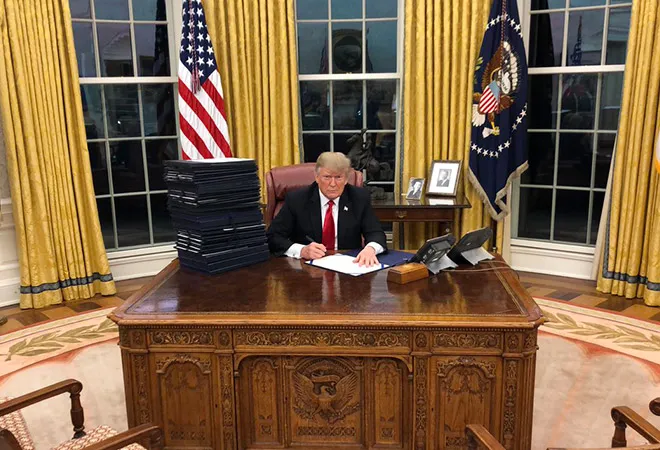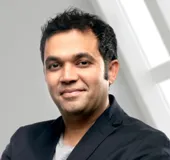-
CENTRES
Progammes & Centres
Location

Trump's recent announcement on troop withdrawal from Syria has been received with strong and mixed emotions worldwide.
Trump's Defence Secretary Jim Mattis and special envoy to the global coalition fighting Islamic State, Brett McGurk, have both resigned, at least in part, because of the announcement. French President Emmanuel Macron dubbed the decision deeply regretful, while other allies of the US responded with cautious criticism.
What’s surprising is that they didn’t see this coming. Trump first announced that the US will be "coming out of Syria, like very soon" in March 2018. Regional allies (mostly Saudi) and advisers convinced the US president that ISIL was not completely defeated, and he agreed for a little more time.
While analysts and allies are accusing Trump of having no coherent strategy in Syria, the reality is that Trump is very disinterested in the outcome of the Syrian conflict. This stands even more relevant when over the past few years, apart from defeating ISIL, the US has not been able to define clear political objectives in Syria. Of course, containing Iranian influence in this geography is an unstated objective, but Syria is not the theatre where the US wishes to confront Iran.
“It leaves our coalition partners confused and our fighting partners bewildered” is what McGurk had to say in a letter to his staff before resigning as the special envoy over Trump’s decision. A majority of analysts believe that this is a shot in the arm for Iran to purportedly create a Shia Crescent from Afghanistan to the Mediterranean, while some say that it emboldens Russia in its regional influence plans.
Most however, fail to see that there are only two key players in the aftermath of this announcement. The Syrian Kurds and Turkey. Everyone else is a bystander or further removed in the impact chain.
Let’s start with seeing the current control map of Syria.
 Source: Al Jazeera
Source: Al Jazeera
Syrian Kurds are politically grouped as the Syrian Democratic Forces (SDF), the backbone of which are the YPG, a Syrian affiliate of the Kurdistan Workers’ Party (PKK), which has fought an insurgency against the Turkish state since the 1980s; Turkey, the United States, and the EU have designated the PKK a terrorist organisation. Despite the YPG’s shared genealogy with the PKK, Washington supported the group because of its battlefield prowess and common enemy spotting in the ISIL. As it beat back ISIL, the YPG took control of additional non-Kurdish territory in Syria, including the mostly Arab cities of Manbij and Raqqa.
The YPG (Kurdish militia) controls close to one third of Syria today. They have wrested this territory from the Syrian state & a host of militias (mostly ISIL) over the last few years. Interestingly, this part of Syria is also more ‘useful’ (read resource rich).
After Assad wrests the last rebel stronghold of Idlib back from the rebels, he would need the resources of SDF held Syria to rebuild the nation. Assad needs the YPG-held region’s vast wheat fields and oil fields — Syria’s largest — to rebuild.
The YPG has already sent multiple delegations to Damascus to negotiate an understanding on post-war revenue sharing, partial-autonomy arrangements. While this might take time and result in a raw deal for the Kurds (as Assad is in no hurry and the Kurds have their back to the wall after US departure), it is way better for the Kurds than the alternative of looming Turkish control/military incursions into their territory.
An understanding will be reached between the Kurds and Assad. Delayed but assured.
However, the Kurds co-existence across the border with the Turks leaves a lot to be imagined. Turkey does not want the YPG, and by extension the PKK, running a Kurdish enclave in Syria directly on its border. In February, Turkish forces invaded the Kurdish district of Afrin in northwest Syria, wresting it from the YPG as Russia and the United States stood by. The group now fears that the story will play out again in Syria’s northeast.
With news of US withdrawal, the Turks and the Kurds are heading for a showdown near the town of Manjib in Syria, which might be delayed by Assad’s intervention, but a long lasting resolution looks unlikely. Assad clearly has a smiling bystander view for now, as the Kurds and the Turks bloody the borders again, in this long miserable war.
The views expressed above belong to the author(s). ORF research and analyses now available on Telegram! Click here to access our curated content — blogs, longforms and interviews.

Avijit Goel is a Senior Director with Flipkart. An alumnus of the Oxford University
Read More +